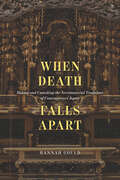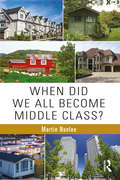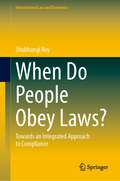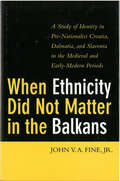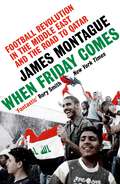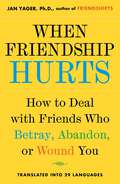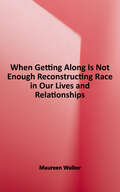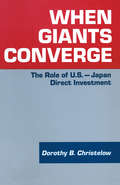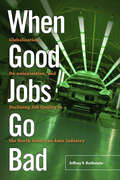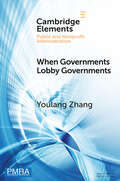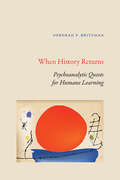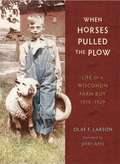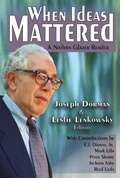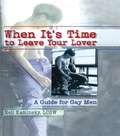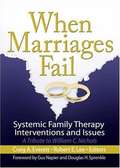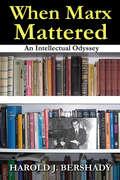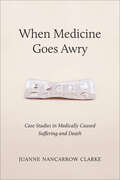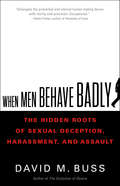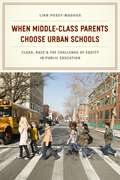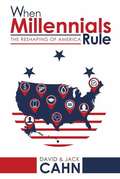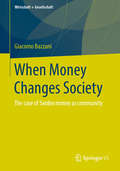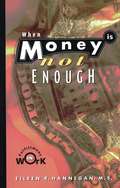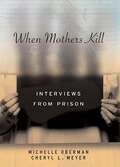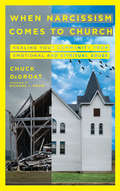- Table View
- List View
When Death Falls Apart: Making and Unmaking the Necromaterial Traditions of Contemporary Japan
by Hannah GouldThrough an ethnographic study inside Japan’s Buddhist goods industry, this book establishes a method for understanding change in death ritual through attention to the dynamic lifecourse of necromaterials. Deep in the Fukuyama mountainside, “the grave of the graves” (o-haka no haka) houses acres of unwanted headstones—the material remains of Japan’s discarded death rites. In the past, the Japanese dead became venerated ancestors through sustained ritual offerings at graves and at butsudan, Buddhist altars installed inside the home. But in twenty-first-century Japan, this intergenerational system of care is rapidly collapsing. In noisy carpentry studios, flashy funeral-goods showrooms, neglected cemeteries, and cramped kitchens where women prepare memorial feasts, Hannah Gould analyzes the lifecycle of butsudan, illuminating how they are made, circulate through religious and funerary economies, mediate intimate exchanges between the living and the dead, and—as the population ages, families disperse, and fewer homes have space for large lacquer cabinets—eventually fall into disuse. What happens, she asks, when a funerary technology becomes obsolete? And what will take its place? Gould examines new products better suited to urban apartments: miniature urns and sleek altars inspired by Scandinavian design, even reliquary jewelry. She visits an automated columbarium and considers new ritual practices that embrace impermanence. At an industry expo, she takes on the role of “demonstration corpse.” Throughout, Gould invites us to rethink memorialization and describes a distinct form of Japanese necrosociality, one based on material exchanges that seek to both nurture the dead and disentangle them from the world of the living.
When Did We All Become Middle Class?
by Martin NunleeIn When Did We All Become Middle Class?, Martin Nunlee discusses how a lack of class identity gives people a false sense of their relationship to power, which has made the US population accept the myth that they live in a meritocracy. This book examines social class within the framework of psychological tendencies, everyday interactions, institutions and pervasive cultural ideas? to show how Americans have shifted from general concerns of social and economic equality to fragmented interests groups. Written in a conversational style, this book is a useful tool for undergraduate courses covering social class, such as inequality, stratification, poverty, and social problems.
When Do People Obey Laws?: Towards an Integrated Approach to Compliance (International Law and Economics)
by Shubhangi RoyThis book examines the intricate dynamics of when individuals adhere to laws, taking into account the context in which laws attempt to shape human behavior. While existing literature touches upon various reasons why people comply with laws, the book focuses on a critical question which has been missing from the discussion: when do people obey laws? By treating law as a form of social communication, it develops an integrated framework to answer this question. It explores how social, psychological, and institutional conditions shape compliance decisions of individuals. What does a law signify? When does the compulsion to obey arise? When do individuals comply out of a fear for legal sanctions or social repercussions? Why do some laws have high symbolic values and others fail despite harsh punishments? The book unveils the contextual intricacies that underlie obedience to law. It challenges conventional wisdom and offers a fresh perspective on the power and limitationsof law in shaping human behavior. For scholars and academics seeking a deeper understanding of legal compliance and role of law in shaping behaviors, this book will be an indispensable resource.
When Ethnicity did not Matter in the Balkans: A Study of Identity in Pre-Nationalist Croatia, Dalmatia, and Slavonia in the Medieval and Early-Modern Periods
by John V. A. Fine Jr."This is history as it should be written. In When Ethnicity Did Not Matter in the Balkans, a logical advancement on his earlier studies, Fine has successfully tackled a fascinating historical question, one having broad political implications for our own times. Fine's approach is to demonstrate how ideas of identity and self-identity were invented and evolved in medieval and early-modern times. At the same time, this book can be read as a critique of twentieth-century historiography-and this makes Fine's contribution even more valuable. This book is an original, much-needed contribution to the field of Balkan studies. " -Steve Rapp, Associate Professor of Caucasian, Byzantine, and Eurasian History, and Director, Program in World History and Cultures Department of History, Georgia State University Atlanta When Ethnicity Did Not Matter in the Balkansis a study of the people who lived in what is now Croatia during the Middle Ages (roughly 600-1500) and the early-modern period (1500-1800), and how they identified themselves and were identified by others. John V. A. Fine, Jr. , advances the discussion of identity by asking such questions as: Did most, some, or any of the population of that territory see itself as Croatian? If some did not, to what other communities did they consider themselves to belong? Were the labels attached to a given person or population fixed or could they change? And were some people members of several different communities at a given moment? And if there were competing identities, which identities held sway in which particular regions? InWhen Ethnicity Did Not Matter in the Balkans, Fine investigates the identity labels (and their meaning) employed by and about the medieval and early-modern population of the lands that make up present-day Croatia. Religion, local residence, and narrow family or broader clan all played important parts in past and present identities. Fine, however, concentrates chiefly on broader secular names that reflect attachment to a city, region, tribe or clan, a labeled people, or state. The result is a magisterial analysis showing us the complexity of pre-national identity in Croatia, Dalmatia, and Slavonia. There can be no question that the medieval and early-modern periods were pre-national times, but Fine has taken a further step by demonstrating that the medieval and early-modern eras in this region were also pre-ethnic so far as local identities are concerned. The back-projection of twentieth-century forms of identity into the pre-modern past by patriotic and nationalist historians has been brought to light. Though this back-projection is not always misleading, it can be; Fine is fully cognizant of the danger and has risen to the occasion to combat it while frequently remarking in the text that his findings for the Balkans have parallels elsewhere. John V. A. Fine, Jr. is Professor of History at the University of Michigan.
When Friday Comes: Football Revolution in the Middle East and the Road to Qatar
by James Montague'Passionate and moving and provides further evidence of the universality of football' Jonathan Wilson, FourFourTwoThe definitive story of the Middle East's unstoppable rise to football superpower, and the road to the Qatar World CupWhen James Montague first began covering football in the Middle East two decades ago, people asked him what future there could possibly be for the beautiful game in one of the most volatile regions in the world. In the years that followed, it would become one of the biggest stories in global sport, from the from revolutionary ultras of the Arab Spring and the takeover of some of the world's biggest clubs by the Emirati super rich, to Qatar's controversial journey towards hosting the 2022 World Cup finals.The only Western journalist covering the story on the ground from the very beginning, James Montague tells the definitive tale of the region's rise to ultimate power player in the global game in a fully revised and updated edition. Travelling to every country in the Middle East and meeting fans, players, workers and campaigners, he paints an unforgettable picture of football in a controversial, vibrant and surprising new world.
When Friendship Hurts: How to Deal with Friends Who Betray, Abandon, or Wound You
by Jan Yager"HOW COULD YOU DO THAT TO ME?" We've all had friendships that have gone bad. Whether it takes the form of a simple yet inexplicable estrangement or a devastating betrayal, a failed friendship can make your life miserable, threaten your success at work or school, and even undermine your romantic relationships. Finally there is help. In When Friendship Hurts, Jan Yager, recognized internationally as a leading expert on friendship, explores what causes friendships to falter and explains how to mend them -- or end them. In this straightforward, illuminating book filled with dozens of quizzes and real-life examples, Yager covers all the bases, including: The twenty-one types of negative friends -- a rogues' gallery featuring such familiar types as the Blood-sucker, the Fault-finder, the Promise Breaker, and the Copycat How to recognize destructive friends as well as how to find ideal ones The e-mail effect -- how electronic communication has changed friendships for both the better and the worse The misuse of friendship at work -- how to deal with a co-worker's lies, deceit, or attempts at revenge How to stop obsessing about a failed friendship And much more The first highly prescriptive book to focus on the complexities of friendship, When Friendship Hurts demonstrates how, why, and when to let go of bad friends and how to develop the positive friendships that enrich our lives on every level. For everyone who has ever wondered about friends who betray, hurt, or reject them, this authoritative book provides invaluable insights and advice to resolve the problem once and for all.
When Getting Along is not Enough: Reconstructing Race in Our Lives and Relationships
by Maureen Walker“Using anecdotes from her psychology practice, Walker provides a way for educators and social service professionals to enter into cross-racial discussions about race and racial relations. She identifies skills that are essential for repairing the damage wrought by racism and provides exercises to stimulate group conversations in staff development, classrooms, and workplace training”-- Provided by publisher.
When Giants Converge: Role of US-Japan Direct Investment
by Dorothy B. ChristelowThis text presents an analysis of how international direct investment since World War II has played an important role in the process by which industrial countries generate technology and productivity growth. It covers the complex relations between the US and Japan since 1945.
When Good Jobs Go Bad: Globalization, De-unionization, and Declining Job Quality in the North American Auto Industry
by Jeffrey S. RothsteinFrom Chinese factories making cheap toys for export, to sweatshops in Bangladesh where name-brand garments are sewn--studies on the impact of globalization on workers have tended to focus on the worst jobs and the worst conditions. But in When Good Jobs Go Bad, Jeffrey Rothstein looks at the impact of globalization on a major industry--the North American auto industry--to reveal that globalization has had a deleterious effect on even the most valued of blue-collar jobs. Rothstein argues that the consolidation of the Mexican and U.S.-Canadian auto industries, the expanding number of foreign automakers in North America, and the spread of lean production have all undermined organized labor and harmed workers. Focusing on three General Motors plants assembling SUVs--an older plant in Janesville, Wisconsin; a newer and more viable plant in Arlington, Texas; and a "greenfield site" (a brand-new, state-of-the-art facility) in Silao, Mexico--When Good Jobs Go Bad shows how global competition has made nonstop, monotonous, standardized routines crucial for the survival of a plant, and it explains why workers and their local unions struggle to resist. For instance, in the United States, General Motors forced workers to accept intensified labor by threatening to close plants, which led local unions to adopt "keep the plant open" as their main goal. At its new factory in Silao, GM had hand-picked the union--one opposed to strikes and committed to labor-management cooperation--before it hired the first worker. Rothstein's engaging comparative analysis, which incorporates the viewpoints of workers, union officials, and management, sheds new light on labor's loss of bargaining power in recent decades, and highlights the negative impact of globalization on all jobs, both good and bad, from the sweatshop to the assembly line.
When Governments Lobby Governments: The Institutional Origins of Intergovernmental Persuasion in America (Elements in Public and Nonprofit Administration)
by Youlang ZhangWhy are some subnational governments more likely to lobby the national government than others? Extant research in social sciences has widely discussed lobbying dynamics in the private sector. However, governments lobby governments, too. In the United States, lobbying is a popular strategy for state and local governments to obtain resources from and influence policies in the federal government. Nevertheless, extant research offers limited theoretical analysis or empirical evidence on this phenomenon. This Element provides a comprehensive study of intergovernmental lobbying activities in the United States and, in particular, an institutional analysis of the lobbying decisions of state and local governments. The study findings contribute to public administration, public policy, and political science literature by offering theoretical and empirical insights into the institutional factors that might influence subnational policymaking, fiscal resource management, intergovernmental relations, and democratic representation.
When History Returns: Psychoanalytic Quests for Humane Learning (SUNY series, Transforming Subjects: Psychoanalysis, Culture, and Studies in Education)
by Deborah P. BritzmanWhen History Returns brings together psychoanalytic theories of learning with the antinomies of social strife. From a psychoanalytic perspective, history returns through transitional scenes of inheriting a past one could not make, experiencing a present affected by what came before, and facing a future one can neither know nor predict. Taking such scenes as the subject of education, Deborah P. Britzman provides new approaches and vocabulary for conceptualizing experience and understanding, as expressed in psychoanalysis, literature, film, clinical case studies, and warm pedagogy. Britzman argues that novel quests for humane responsibility take hold in the fallout of understanding, in the feel of history, in imaginative dialogues and missed encounters, and in searches for friendship, belonging, and affiliation. Each chapter charts these quests in contemporary education, carrying readers into the heart of learning and the emotional situations that urge the transitions of difficult knowledge into care for thinking and the questions that follow.
When Horses Pulled the Plow
by Olaf F. LarsonIn 1910, when Olaf F. Larson was born to tenant livestock and tobacco farmers in Rock County, Wisconsin, the original barn still stood on the property. It was filled with artifacts of an earlier time--an ox yoke, a grain cradle, a scythe used to cut hay by hand. But Larson came of age in a brave new world of modern inventions--tractors, trucks, combines, airplanes--that would change farming and rural life forever. <P> When Horses Pulled the Plow is Larson's account of that rural life in the early twentieth century. He weaves invaluable historical details--including descriptions of farm equipment, crops, and livestock--with wry tales about his family, neighbors, and the one-room schoolhouse he attended, revealing the texture of everyday life in the rural Midwest almost a century ago. This memoir, written by Larson in his ninth decade, provides a wealth of details recalled from an earlier era and an illuminating read for anyone with their own memories of growing up on a farm.
When Ideas Mattered: A Nathan Glazer Reader
by Leslie LenkowskySociologist Nathan Glazer's remarkably long and productive career as a New York intellectual spans seven decades from the Great Depression era to the late twentieth century. A voracious intellect with a perpetual sense of curiosity, he defies easy labelling. When Ideas Mattered is a critical volume, but it also contains autobiographical essays Glazer has written over the years to explain the evolution of his own thought.The book is a sensitive and nuanced examination of a towering intellectual figure on the American scene. It is organized into sections corresponding to Glazer's wide ranging interests: ethnicity, race, social policy and urbanism, and architecture. He has written on the myth of the American melting pot, the nature of American communism, the perils and importance of affirmative action, and the limits of social policy. Because Glazer's work has influenced succeeding generations of thinkers and scholars in a number of fields, the editors have included appraisals and assessments by several of these writers written especially for this volume.
When Is Economic Growth Pro-Poor? Experiences in Malaysia and Pakistan
by Mahmood Hasan KhanA report from the International Monetary Fund.
When It's Time to Leave Your Lover: A Guide for Gay Men
by Neil KaminskyWhen It's Time to Leave Your Lover: A Guide for Gay Men is for people who need help ending a gay male relationship that is no longer viable or for friends and family who want to support a gay man experiencing a breakup. This book provides tips on how to successfully cope with the post-breakup period and how to grow emotionally from the experience. You will discover how to tell a lover good-bye while learning about the psychological and social changes to be anticipated in this situation. When It's Time to Leave Your Lover gives you helpful, practical advice on how to cope with ending a relationship in a positive and constructive manner.This unique book contains actual interviews with gay men and vignettes that clearly illustrate the topics. They provide you with a deeper understanding of all aspects of the break-up period. When It's Time to Leave Your Lover is a unique how-to book that gives you helpful and practical advice on such important issues as: making an assessment of your relationship to determine if it is no longer viable constructively leaving your partner and making it a positive experience coping with the uncoupling experience by using specific techniques to avoid common mistakes such as the rebound relationship growing from your uncoupling experience so you can enjoy more fulfilling relationships in the future managing the social and psychological effects of a breakup through use of your support system of family and friends seeking support through specific organizations available in several different cities that help gay men deal with breakupsSincere and full of knowledgeable advice, When It's Time to Leave Your Lover offers proven suggestions that will help you revisit the mistakes you made during your relationship, preparing you for more satisfying relationships in the future that are based on compatibility, respect, and trust. A valuable and reader-friendly book, When It's Time to Leave Your Lover will enhance your understanding of the break-up experience and will help you understand, learn from, and get past the heartache of ending a relationship.
When Marriages Fail: Systemic Family Therapy Interventions and Issues
by Craig A. Everett'When Marriages Fail' presents several leading experts in the field discussing the full spectrum of clinical interventions and family therapy for troubled and divorcing families.
When Marx Mattered: An Intellectual Odyssey
by Harold J. BershadyA beautifully written, trenchant, and moving memoir, When Marx Mattered follows Harold J. Bershady's odyssey from childhood through his coming of intellectual age. The wounds and pleasures of his childhood include fear of Nazis, poverty, the joys and constraints of Jewishness, his caring family and love of music, and the confusion surrounding World War II. In this book, Bershady describes his teenage encounter with Marxism and how it provided some understanding of the world and hope for peace.Bershady gives us a serious portrayal of the evolution of scholarly judgment, but also a social history of the second half of the twentieth century, refracted through the author's own experiences in which Jewish Americans played an important but under-appreciated part. Along the way, the author corrects the misapprehension that Jewish or non-Jewish American political radicals only evolve into conservatives. Through his own mistakes and hard-won lessons, Bershady shows the power, importance, and morality that intellectual standards play in enabling an intellectual to achieve sound and fair judgments.Bershady firmly believes that his achievements in the social sciences are grounded in the fact that he also studied philosophy, literature, and history—all of which immeasurably deepened his understanding of social life. The generational portrait in this book is both an homage to those who preceded him and a hope for educational broadening of social science in the generation to come.
When Medicine Goes Awry: Case Studies in Medically Caused Suffering and Death
by Juanne Nancarrow ClarkeMedical error often results in disability, pain, and suffering, and it is the third leading cause of death in hospitals. Despite its frequency, medical error has been largely invisible to the mainstream public. Within the medical system itself, medical error is often understood as the result of an isolated case of malpractice. When Medicine Goes Awry argues that the causes of medical error are not an anomaly but rather the outcome of a number of factors at play, ranging from political to social to economic. When Medicine Goes Awry dismisses the common blame perspective associated with medical malpractice, instead asserting that medical error is – and will continue to be – inevitable, given the relentless and expanding processes of medicalization. Shedding light on the ways these forces lead to medicine going awry, the book examines seven well-known cases of medical error. Taking an in-depth look at both patients and medical care providers, Juanne Nancarrow Clarke offers a novel approach to medical error or mishap that applies sociological research and theory to the larger societal forces contributing to a taxing and endemic medical problem.
When Men Behave Badly: The Hidden Roots of Sexual Deception, Harassment, and Assault
by David BussA leading evolutionary psychologist and sex researcher provides a unified new theory of sexual conflict and shows how its battles play out in the bar room, the bedroom, and the boardroom.Sexual conflict permeates ancient religions, from injunctions about thy neighbor's wife to the permissible rape of infidels. It is etched in written laws that dictate who can and cannot have sex with whom. Its manifestations shape our sexual morality, evoking approving accolades or contemptuous condemnation. It produces sexual double standards that flourish even in the most sexually egalitarian cultures on earth. And although every person alive struggles with sexual conflict, most of us see only the tip of the iceberg: dating deception, a politician's unsavory sexual grab, the slow crumbling of a once-happy marriage, a romantic breakup that turns nasty.When Men Behave Badly shows that this "battle of the sexes" is deeper and far more pervasive than anyone has recognized, revealing the hidden roots of sexual conflict—roots that originated over deep evolutionary time—which define the sexual psychology we currently carry around in our 3.5-pound brains. Providing novel insights into our minds and behaviors, When Men Behave Badly presents a unifying new theory of sexual conflict, and offers practical advice for men and women seeking to avoid it.
When Middle-Class Parents Choose Urban Schools: Class, Race, & the Challenge of Equity in Public Education
by Linn Posey-MaddoxIn recent decades a growing number of middle-class parents have considered sending their children to—and often end up becoming active in—urban public schools. Their presence can bring long-needed material resources to such schools, but, as Linn Posey-Maddox shows in this study, it can also introduce new class and race tensions, and even exacerbate inequalities. Sensitively navigating the pros and cons of middle-class transformation, When Middle-Class Parents Choose Urban Schools asks whether it is possible for our urban public schools to have both financial security and equitable diversity. Drawing on in-depth research at an urban elementary school, Posey-Maddox examines parents’ efforts to support the school through their outreach, marketing, and volunteerism. She shows that when middle-class parents engage in urban school communities, they can bring a host of positive benefits, including new educational opportunities and greater diversity. But their involvement can also unintentionally marginalize less-affluent parents and diminish low-income students’ access to the improving schools. In response, Posey-Maddox argues that school reform efforts, which usually equate improvement with rising test scores and increased enrollment, need to have more equity-focused policies in place to ensure that low-income families also benefit from—and participate in—school change.
When Millennials Rule: The Reshaping Of America
by David Cahn Jack CahnWhen Millennials Rule offers an optimistic story about how the generation that grew up through 9/11 and the Great Recession will rise above these setbacks to unify around common-sense solutions and take back America's future. China has swallowed our jobs. Social security is going bankrupt. Radical Islamic terrorists threaten our safety. Our planet is on the brink of environmental disaster. Meanwhile, politicians pound their chests in ideological wars that enrich lobbyists and special interest groups at the expense of the American voter. If America today is at a crossroads, it is the millennial generation - long ridiculed as selfish egotists and narcissistic Twitter drones - that will face the momentous task of restoring the promise of a better future. But where are millennials leading America? How will this generation shape our nation's future? These are questions everyone is asking - in newspapers, in books, on television and on Twitter. And they're baffled. The Nation called it "Millennial Madness" and The Atlantic complained that millennial political views "don't make any sense. " Five years ago, David and Jack Cahn - identical twins, competitive debaters, and New York magazine's "Twin Titans" - set out to answer these questions and uncover their generation's political identity. Traveling across the country, from Kentucky to Illinois to California, they talked with more than 10,000 young Americans about everything from campaign finance reform to nuclear proliferation, Beyoncé and Taylor Swift. When Millennials Rule is the story of their journey. They start in New Haven, Conn. , just months after the Newtown shooting, and end in Philadelphia, where the 2016 Democratic National Convention is set to launch one of the most contentious elections in modern history. Combining thorough reporting with the compelling stories of their peers, the brothers craft an authentic, first-person portrait of what millennials stand for and why.
When Money Changes Society: The case of Sardex money as community (Wirtschaft + Gesellschaft)
by Giacomo BazzaniClassical sociology considered money as central to the functioning of modern society, relatingit to a progressive expansion of instrumental rationality and the emergence of weaker social ties.Modern money, the universal equivalent described by Simmel, facilitates theexchange of goods and values by providing a single unit of account. This “frees” people and thingsfrom traditional social ties and makes them free to “sell” their work and trade goods on markets thatincreasingly erode national borders. Modern money thus frees the individual from traditional socialties and facilitates the creation of ever larger and more inter-connected markets. Sardex money, onthe other hand, seems to work in the opposite direction: the weak social ties of ordinary economictransactions are replaced by strong ones, characterised by a high level of reciprocity and by an ethical code. Furthermore the movement of goods is restricted to the regional level and much isdone to promote economic exchanges between member companies.
When Money Is Not Enough: Fulfillment in Work (The\business Of Life Ser.)
by M. S. Eileen R. HanneganStating that effective companies should offer supportive environments for their employees, a guide on how to build a "healthy organization" discusses dysfunction, personality battles, interdependency, and more.
When Mothers Kill: Interviews from Prison
by Cheryl L. Meyer Michelle ObermanWinner of the 2008 Outstanding Book Award by the Academy of Criminal Justice SciencesMichelle Oberman and Cheryl L. Meyer don’t write for news magazines or prime-time investigative television shows, but the stories they tell hold the same fascination. When Mothers Kill is compelling. In a clear, direct fashion the authors recount what they have learned from interviewing women imprisoned for killing their children. Readers will be shocked and outraged—as much by the violence the women have endured in their own lives as by the violence they engaged in—but they will also be informed and even enlightened.Oberman and Meyer are leading authorities on their subject. Their 2001 book, Mothers Who Kill Their Children, drew from hundreds of newspaper articles as well as from medical and social science journals to propose a comprehensive typology of maternal filicide. In that same year, driven by a desire to test their typology—and to better understand child-killing women not just as types but as individuals—Oberman and Meyer began interviewing women who had been incarcerated for the crime. After conducting lengthy, face-to-face interviews with forty prison inmates, they returned and selected eight women to speak with at even greater length. This new book begins with these stories, recounted in the matter-of-fact words of the inmates themselves.There are collective themes that emerge from these individual accounts, including histories of relentless interpersonal violence, troubled relationships with parents (particularly with mothers), twisted notions of romantic love, and deep conflicts about motherhood. These themes structure the books overall narrative, which also includes an insightful examination of the social and institutional systems that have failed these women. Neither the mothers nor the authors offer these stories as excuses for these crimes.
When Narcissism Comes to Church: Healing Your Community From Emotional and Spiritual Abuse
by Chuck DeGroatWhy does narcissism seem to thrive in our churches?isWhen Narcissism Comes to Church
